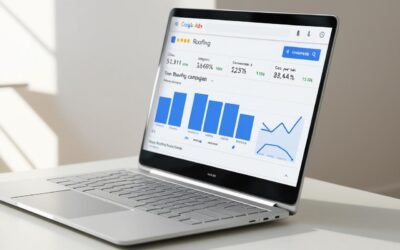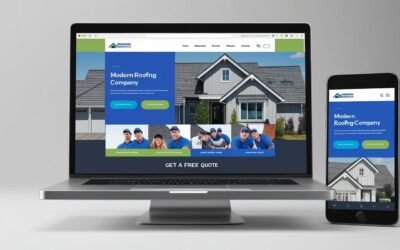Grow Faster, Close More Deals, and Keep Customers for Life
Running a roofing business isn’t just about climbing ladders and fixing leaks—it’s about managing leads, scheduling jobs, following up with customers, and closing deals efficiently. That’s where a CRM (Customer Relationship Management) system becomes your best business partner.
But not all CRMs are built with roofers in mind.
In this guide, we’ll break down:
- What a CRM does for a roofing business
- The top CRM tools made for contractors
- How to use a CRM effectively to grow your revenue
What Is a CRM (And Why Roofers Need One)
A CRM is software that helps you manage your customer interactions, sales pipeline, job progress, and follow-ups—all from one central place.
Without a CRM, roofers often deal with:
- Lost leads from phone calls or Facebook DMs
- Missed follow-ups
- Disorganized notes or job statuses
- Poor communication with crews or customers
With a CRM, you get:
- A clear sales pipeline
- Automated reminders and follow-ups
- Easy estimates and invoices
- Centralized customer data
- Better team coordination
Bottom line: A CRM saves time, reduces stress, and helps you close more jobs without hiring more staff.
Top CRM Tools for Roofing Contractors
Here are the best CRM platforms tailored to roofing companies, based on usability, features, and pricing.
1. JobNimbus
Best for: All-in-one roofing business management
Key Features:
- Lead tracking and automated follow-ups
- Digital estimates and invoices
- Workflow and job board views
- Integrates with QuickBooks, EagleView, and Google Calendar
- Mobile app for crews and salespeople
Pros:
✅ Roofing-specific design
✅ Built-in templates
✅ Visual job progress tracking
How to Use It Right:
- Set up stages like “New Lead > Estimate Sent > Contract Signed > In Progress > Completed”
- Automate follow-ups every 2-3 days until a deal closes
- Use photo uploads from the job site to keep all notes in one place
2. AccuLynx
Best for: Medium to large roofing businesses
Key Features:
- Robust sales pipeline management
- Production scheduling
- Material ordering integrations
- Aerial measurements
- Document storage and proposal builder
Pros:
✅ Built for roofing from the ground up
✅ Estimating + production in one place
How to Use It Right:
- Use templates for standard jobs (e.g., shingle roof replacement)
- Set custom notifications for when tasks are delayed
- Pull reports weekly on team performance and job status
3. Builder Prime
Best for: Roofers who want CRM + production tracking
Key Features:
- Lead capture and tracking
- Proposal generation
- Production calendar
- Sales reporting
- Automations and workflows
Pros:
✅ Easy to use for office teams
✅ End-to-end job lifecycle management
How to Use It Right:
- Connect web forms and Facebook ads to auto-import leads
- Tag leads by type (repair, install, commercial) for targeted marketing
- Track time from lead to close to improve sales efficiency
4. HubSpot (Free or Paid Plans)
Best for: Roofers just starting or using a basic CRM
Key Features:
- Contact database
- Pipeline stages and deal tracking
- Email templates and automation
- Appointment scheduling
Pros:
✅ Great free tier
✅ Easy to use for simple follow-up systems
Cons:
❌ Lacks roofing-specific integrations
❌ Requires customization for contractors
How to Use It Right:
- Create stages like “Estimate Sent” or “Needs Follow-up”
- Use automated emails after a quote is sent
- Monitor email open/clicks to see who’s interested
5. Salesforce + Contractor Add-ons
Best for: Larger operations with custom workflows
Key Features:
- Extremely customizable
- Advanced analytics
- Integration with other systems
Pros:
✅ Scalable to any size
✅ Excellent reporting
Cons:
❌ Can be overkill for smaller companies
❌ Requires training
How to Use It Right:
- Work with a roofing-focused Salesforce consultant
- Use dashboards to track sales, jobs, and customer lifetime value
- Automate lead scoring and nurture sequences
CRM Features Roofers Should Look For
Whether you’re choosing your first CRM or upgrading from spreadsheets, make sure your CRM includes these roofing essentials:
| Feature | Why It Matters |
|---|---|
| 📍 Lead Tracking | Know where each lead stands—quoted, closed, lost |
| 📆 Scheduling | Assign jobs and sync with your team’s calendar |
| 🧾 Estimates & Invoicing | Send digital quotes and get faster approvals |
| 📸 Job Documentation | Upload photos, permits, and notes in one place |
| 📲 Mobile App | Stay connected from the field |
| 🔄 Automations | Save time with auto-reminders and follow-ups |
| 📊 Reporting | See what’s working and where you’re losing money |
Tips to Use Your Roofing CRM Effectively
A CRM is only powerful when used consistently. Here’s how to make it part of your daily workflow:
✔ Standardize Your Sales Pipeline
Have clear steps from lead to close (e.g., “Lead In > Site Visit > Estimate > Signed > In Progress > Paid”).
✔ Automate Follow-Ups
Don’t rely on memory. Set up automatic text/email reminders after sending an estimate.
✔ Train Your Team
Everyone—sales, admin, and crew—should know how to log updates, upload images, and tag statuses.
✔ Integrate with Other Tools
Connect your CRM to QuickBooks, EagleView, Gmail, or Slack to create an all-in-one system.
✔ Review Reports Weekly
Check win/loss ratios, average job size, and follow-up response times. Use that data to make better decisions.
Final Thoughts: The Right CRM Is a Revenue Multiplier
A good CRM doesn’t just organize your roofing business—it amplifies it.
With better lead management, faster follow-ups, and smoother scheduling, you’ll close more deals without chasing paperwork or hiring extra staff.
So whether you’re a solo roofer or running a 10-truck team, now’s the time to stop running your business from your inbox or notepad—and start using a CRM to grow smarter.
Need Help Choosing or Setting Up a CRM?
At RankRoofer.Digital, we help roofing contractors set up, customize, and manage CRM systems that actually grow your business.
📞 Book a free consultation to see which CRM fits your roofing company best.










